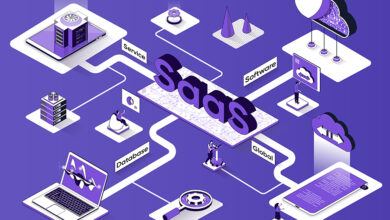IaaS in Cloud Computing

What is IaaS in Cloud Computing?
Cloud computing is increasingly becoming the chosen method of storing, processing, and accessing data, on the ‘cloud,’ replacing personalized physical storage devices. Most Gmail and Outlook users utilize their free cloud storage space, provided by Google and Microsoft respectively. IaaS makes it possible for them to provide the cloud storage and other layered services.
What is IaaS in Cloud Computing?
IaaS or Infrastructure-as-a-Service is a cloud computing service model where computing infrastructure include servers, networking, virtual machines, etc. are provided to the user. Simply, the physical storage, hosting and networking which creates the virtual space or the cloud is the IaaS.
Features of IaaS in Cloud Computing
1. Storage
 The cloud is the new-age storage method where users can upload data via the internet. Physical data centers store huge amounts of data that millions of users, on the various internet platforms, upload on a daily basis. Platforms such as Google, Facebook, Instagram, Bing, and Microsoft.
The cloud is the new-age storage method where users can upload data via the internet. Physical data centers store huge amounts of data that millions of users, on the various internet platforms, upload on a daily basis. Platforms such as Google, Facebook, Instagram, Bing, and Microsoft.
2. Network
 Infrastructure as a Service provides you with necessary hardware equipment such as data centers, web hosting, servers, etc. for the virtual data environment. Many organizations operate on a private cloud network that allows its employees easy access, storage and dissemination of data. Google Compute Engine, for instance, provides you with a host of infrastructure for you to access services like storage, computing and web hosting, networking, etc.
Infrastructure as a Service provides you with necessary hardware equipment such as data centers, web hosting, servers, etc. for the virtual data environment. Many organizations operate on a private cloud network that allows its employees easy access, storage and dissemination of data. Google Compute Engine, for instance, provides you with a host of infrastructure for you to access services like storage, computing and web hosting, networking, etc.
3. Load Balancing
 IaaS provides elastic load balancing capabilities, increasing and decreasing the storage capacity of your server if required. Load balancing is a crucial function that allows organizations and corporations to disseminate the workload onto different networks and computers.
IaaS provides elastic load balancing capabilities, increasing and decreasing the storage capacity of your server if required. Load balancing is a crucial function that allows organizations and corporations to disseminate the workload onto different networks and computers.
Advantages of IaaS in Cloud Computing
IaaS comes with its own benefits. Some of them include –
- Pay per Use: Pay for what you use, that is, if you can use up to 15GB of cloud storage on Google, it is free. But exceeding this amount, you have to pay for as much storage capacity as you require. Pay for only the resources you’ve used.
- Scalability: Makes resources readily available to users with minimum wastage of time. Scale capacity as per your needs, whenever you need it.
- Save Time and Cost: Your cloud service provider is responsible for setting up and maintaining your cloud computing system. IaaS makes the most crucial services, such as storage or computing services, readily available, saving you a lot of time and money.
- Location Independence: IaaS makes cloud computing services readily available from anywhere. You only have to log in to your account or network and it is ready to use!
- Business Growth: Efficiency is the key to business growth and IaaS has proven to be essential in pushing boundaries for many business organizations. In an already digitized era, IaaS provides the final push towards a more holistic integration.
IaaS in Cloud Computing – How useful is it?
IaaS is one of the 3 main categories of cloud computing services that provide businesses with powerful computing resources over the internet. Some of the common reasons’ users choose IaaS are features like private clouds, automation and backup. Some of the most common service providers include Amazon Web Services (AWS) and Google Cloud Platform (GCP.) All cloud-based services are laid over the foundation provided by IaaS.
Additional Infrastructure as a Service Resources
- Google Cloud – Build apps faster, make smarter business decisions, and connect people anywhere.
- AWS – Develop, deploy, run, and scale virtually any application on the world’s most reliable, secure, and capable cloud.
- Azure – Access cloud compute capacity, virtualization, and scale on demand—and only pay for the resources you use
- OpenStack – Cloud Infrastructure for Virtual Machines, Bare Metal, and Containers
- Google Guide – A CIO’s guide to the cloud: hybrid and human solutions to avoid trade-offs
- Azure Business Benefits – The Azure cloud platform is more than 200 products and cloud services





